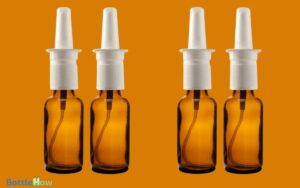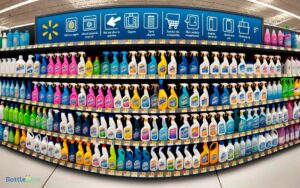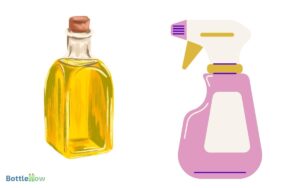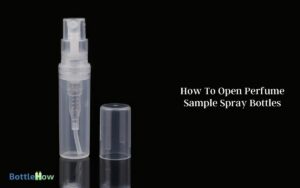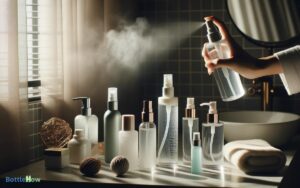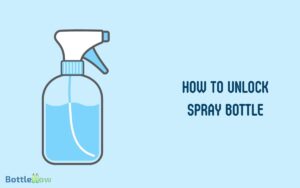Can You Put Muriatic Acid in a Spray Bottle? Explain!
You shouldn’t put muriatic acid in a spray bottle, as its highly corrosive nature presents serious health and safety risks. Spraying the acid can cause it to become airborne, leading to respiratory issues, severe skin burns, and eye damage.
Additionally, muriatic acid can corrode the spray bottle itself, potentially causing leaks that expose you to further harm.
Always use corrosion-resistant containers designed for storing acids and apply the acid with safer methods like a sponge or brush in a well-ventilated area. Protect yourself further by exploring equally effective, less hazardous cleaning alternatives.
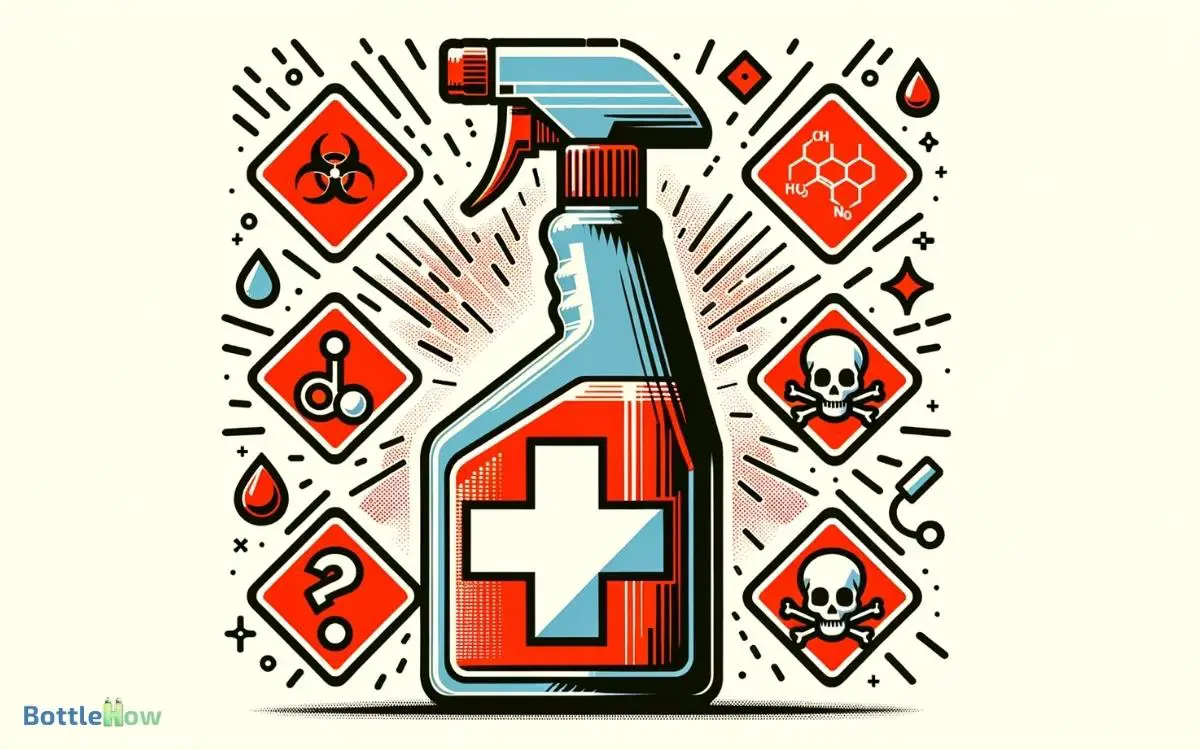
Key Takeaways
Understanding Muriatic Acid
Muriatic acid, commonly known as hydrochloric acid, is a highly corrosive chemical that demands careful handling and specific storage conditions.
You’ll need to store it in a cool, well-ventilated area away from direct sunlight and incompatible substances like bases, oxidizers, or metals.
Make sure the container is made of a material resistant to corrosion—commonly polyethylene or PVC—and is tightly sealed to prevent any leaks or fumes from escaping.
When handling muriatic acid, always wear appropriate personal protective equipment: rubber gloves, safety goggles, and a face shield. It’s also essential to have adequate ventilation to avoid inhaling the fumes.
Being well-prepared and cautious ensures you can use this powerful chemical safely while serving the needs of others effectively.
Risks of Spraying Muriatic Acid
When you consider using muriatic acid in a spray bottle, you must be aware of the significant health hazards it presents.
The acid can cause severe respiratory issues and skin burns if it comes into contact with your body or is inhaled.
Additionally, it’s highly corrosive nature means it can damage virtually any material it contacts, from metals to plastics, posing further risks to both your safety and your property.
Health Hazard Concerns
Spraying muriatic acid poses significant health risks, including severe respiratory issues and skin burns. You must be highly cautious when handling this chemical, especially in a spray form.
The fine mist created can easily be inhaled or contact your skin, leading to potentially serious health problems.
| Risk | Symptoms | Immediate Action |
|---|---|---|
| Respiratory Issues | Coughing, difficulty breathing | Move to fresh air, seek medical attention |
| Skin Burns | Redness, pain, severe burns | Rinse with water, seek medical care |
| Eye Contact | Pain, vision impairment | Flush eyes with water, consult a doctor |
Always wear protective gear, such as a respirator and acid-resistant gloves, to safeguard your health while using muriatic acid.
Material Corrosion Risks
In addition to the health hazards, you’ll also need to take into account how muriatic acid can corrode various materials, potentially damaging tools and surfaces during application.
When you’re considering using this potent acid, especially in a spray form, it’s essential to be aware of the materials that it can degrade.
Here’s what you need to watch out for:
- Metal Fixtures: Muriatic acid can quickly corrode metals, leading to structural damage or failure.
- Painted Surfaces: It can strip paint, leading to costly repairs or replacements.
- Plastic Components: Certain plastics may dissolve or weaken upon contact.
- Rubber Seals: Acid can cause rubber to deteriorate, compromising seals and joints.
- Wooden Structures: It can eat into wood, causing discoloration and structural damage.
Suitable Containers for Muriatic Acid
Selecting the appropriate container for muriatic acid is essential, as it reacts with many materials, potentially causing hazardous conditions.
You’ll want to use containers made of materials resistant to chemical corrosion, such as certain plastics like polyethylene or polypropylene. It’s vital to avoid using metal containers, as the acid can quickly corrode these materials, leading to leaks and dangerous spills.
When providing services involving muriatic acid, always make sure the containers are certified for chemical storage, clearly labeled, and equipped with secure lids to prevent any accidental exposure.
This attention to detail not only safeguards your health but also ensures the safety of those around you, maintaining a responsible and secure environment for everyone involved.
Safe Handling Practices
When handling muriatic acid, you must wear appropriate personal protective equipment (PPE), including gloves, goggles, and a respirator, to shield yourself from its harmful effects.
Here are essential practices to guarantee safety:
- Work in a well-ventilated area: Prevent inhaling fumes by ensuring good airflow.
- Use acid-resistant containers: Avoid material degradation and potential leaks.
- Avoid skin contact: Immediate wash areas of skin exposure with plenty of water.
- Store securely: Keep acid in a cool, dry place away from incompatible substances.
- Prepare for emergencies: Have neutralizing substances and a first aid kit ready.
Understanding and implementing these safety measures can safeguard you and others from potential hazards associated with muriatic acid.
Effective Application Techniques
Having covered the safety precautions, let’s now focus on how you can apply muriatic acid effectively. When using muriatic acid, always wear protective gear and make sure the area is well-ventilated.
It’s important to dilute the acid properly according to the manufacturer’s guidelines—typically, a 1:10 ratio of acid to water is sufficient for most cleaning tasks.
Apply the solution using a sponge or brush rather than a spray bottle to control the application more carefully and minimize aerosolization.
Work in small sections and allow the acid to sit for a few minutes to break down stains before scrubbing lightly. Afterward, rinse the area thoroughly with water to neutralize the acid and prevent damage.
Always dispose of any leftover solution safely.
Alternative Cleaning Solutions
If you’re seeking safer options for cleaning, consider natural cleaning agents and DIY cleaning recipes as viable alternatives. These options not only minimize your exposure to harsh chemicals but also leverage common household items effectively.
You’ll find that ingredients like vinegar and baking soda can be just as effective, without the risks associated with more corrosive substances.
Natural Cleaning Agents
You should consider natural cleaning agents as effective alternatives to harsh chemicals, offering safer, environmentally friendly solutions for your home cleaning needs.
These alternatives not only guarantee the well-being of your family but also safeguard the environment from the harsh effects of synthetic cleaners.
- Vinegar: An excellent disinfectant and deodorizer.
- Baking Soda: Great for scrubbing and neutralizing odors.
- Lemon Juice: Natural bleaching agent that cuts through grease.
- Olive Oil: Perfect for polishing and restoring shine.
- Castile Soap: Gentle yet powerful cleaner suitable for multiple surfaces.
Adopting these natural options can notably reduce your ecological footprint and promote a healthier living space. Always handle any cleaning agent with care to maintain safety within your household.
DIY Cleaning Recipes
To create effective household cleaners from items you likely already have in your pantry, start by exploring these simple DIY cleaning recipes. A classic is the vinegar and water solution; mix equal parts to tackle glass surfaces and mirrors, ensuring streak-free results.
Be aware, though, vinegar can damage natural stone surfaces, so use it cautiously. If you’re dealing with greasy messes, a baking soda paste (three parts baking soda to one part water) can be your go-to. Apply it, let it sit for 15 minutes, then scrub gently and rinse.
Conclusion
While muriatic acid packs a punch for tough cleaning tasks, it’s crucial to handle this potent cleaner with care.
Never use a regular spray bottle; instead, opt for acid-resistant containers to avoid a recipe for disaster. These specialized containers prevent harmful reactions that could damage surfaces or pose safety risks. For instance, putting Murphy Oil Soap in spray bottle not designed for strong cleaners might lead to leaks or deterioration over time. Always check the container’s compatibility with cleaning solutions to ensure safe and effective use.
Always wear protective gear and follow safety protocols rigorously.
If this sounds too challenging, consider safer alternatives.
Remember, when it comes to powerful cleaners, better safe than sorry—your health is worth more than a spotless surface.

